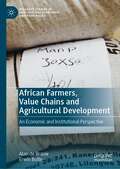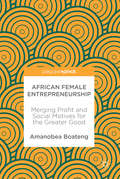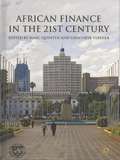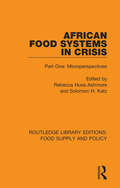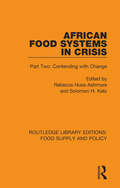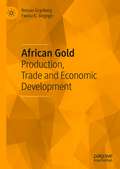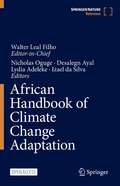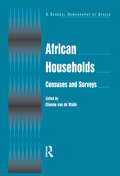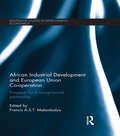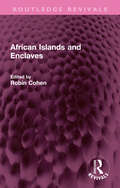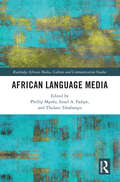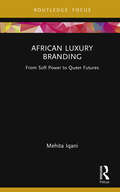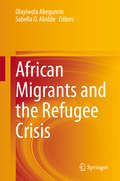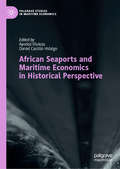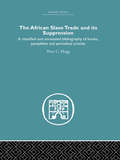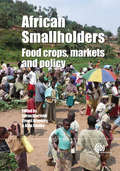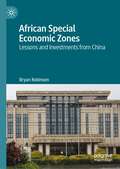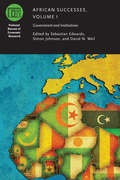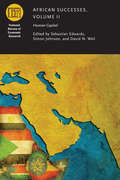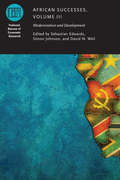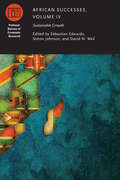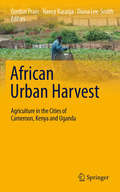- Table View
- List View
African Farmers, Value Chains and Agricultural Development: An Economic and Institutional Perspective (Palgrave Studies in Agricultural Economics and Food Policy)
by Erwin Bulte Alan de BrauwThis book provides a thorough introduction to and examination of agricultural value chains in Sub-Saharan Africa. First, the authors introduce the economic theory of agri-food value chains and value chain governance, focusing on domestic and regional trade in (and consumption of) food crops in a low-income country context. In addition to mainstream and heterodox thinking about value chain development, the book pays attention to political economy considerations. The book also reviews the empirical evidence on value chain development and performance in Africa. It adopts multiple lenses to examine agricultural value chains, zooming out from the micro level (e.g., relational contracting in a context of market imperfections) to the meso level (e.g., distributional implications of various value chain interventions, inclusion of specific social groups) and the macro level (underlying income, population and urbanization trends, volumes and prices, etc.).Furthermore, this book places value chain development in the context of a process the authors refer to as structural transformation 2.0, which refers to a process where production factors (labor, land and capital) move from low-productivity agriculture to high-productivity agriculture. Finally, throughout the book the authors interpret the evidence in light of three important debates: (i) how competitive are rural factor and product markets, and what does this imply for distribution and innovation? (ii) what role do foreign investment and factor proportions play in the development of agri-food value chains in Africa? (iii) what complementary government policies can help facilitate a process of agricultural value chain transformation, towards high-productive activities and enhancing the capacity of value chains to generate employment opportunities and food security for a growing population.
African Female Entrepreneurship: Merging Profit and Social Motives for the Greater Good
by Amanobea BoatengContributing to academic discussions on entrepreneurship and gender in Africa, this book provides coverage of recent trends and an exploration of the evolution of female entrepreneurship over time. This innovative new text, written from an African woman's perspective, fills a gap in the current literature on this topic and places important focus on the role of female entrepreneurship in Africa's development as a continent. Focussing on key issues such as social feminism and the capability approach, the author addresses the possibility of a potential overlap between social entrepreneurship and female entrepreneurship in Africa. Insightful accounts of women from countries such as South Africa, Namibia and Ghana, along with theoretical research into the further development and advancement of female entrepreneurs, make this book an important must-read for those interested in entrepreneurship and gender in Africa.
African Finance in the 21st Century
by Marc Quintyn Geneviève VerdierWith contributions by experts from official agencies in Africa, international financial institutions, the private sector, and academia, this book focuses on financial sector development in Sub-Saharan Africa and how institutions can play a more active role in economic development.
African Food Systems in Crisis: Part One: Microperspectives (Routledge Library Editions: Food Supply and Policy)
by Solomon H. Katz Rebecca Huss-AshmoreOriginally published in 1990. Produced by the Task Force on African Famine of the American Anthropological Association, this is the first of a multi-part project dealing with the long-term and ongoing food crisis in Africa primarily at the level of local production-the microperspective. It offers a series of anthropological and ecological views on the cause of the current problem and on coping strategies used by both indigenous people and developmental planners. The three sections of this volume review current explanations for food problems in Africa, focusing mainly on production and consumption at the household level; they offer a number of perspectives on the environmental, historical, political, and economic contexts for food stress, and include a series of case studies showing the ways in which Africans have responded to the threat of drought and hunger. The extent of research and the degree of scholarship involved in the production of this volume recommend it to all persons concerned with this ultimately global dilemma, particularly those involved in planning and relief efforts.
African Food Systems in Crisis: Part Two: Contending with Change (Routledge Library Editions: Food Supply and Policy)
by Solomon H. Katz Rebecca Huss-AshmoreOriginally published in 1991. Commissioned by the Task Force on African Famine of the American Anthropological Association, this the second part of a project examining the causes of food system failure in Africa and the effects of attempts to remedy the situation. It evaluates the often-retrogressive results of foreign aid to African nations and offers an anthropological perspective on how to reverse this trend. The contributors emphasize integrating all development programs with the regional customs and traditions already in place that have thus far allowed its people to cope with food and water shortages. In the past, various strategies have failed due to misunderstandings and incorrect assumptions concerning gender roles, food consumption habits, social relations, kinship networks, land use and government function. New understanding of the culture must be complemented with multifaceted programs incorporating education, a concern for grass-roots opinion and control, attention to production and consumption patterns, and various forms of broad-spectrum integrated development. The uniqueness research is recommended for all who are concerned about worldwide malnutrition and those who understand the need to recognize local traditions as resources that must be included in any successful development program.
African Gold: Production, Trade and Economic Development
by Roman Grynberg Fwasa K. SingogoThe book explores the evolving economics of gold as a global commodity as well as the production and trade of gold in and from the African continent. The growth of gold as an increasingly important and diverse source of African wealth is examined, alongside the impact that the rise of China in the 21st century has had on the demand for gold. The volatility of the gold price has increased as a result of the dramatic decline of gold demand for manufacturing purposes. Gold is Africa’s second largest export after oil and is a perfect metaphor for a continent rich in resources while so much of its population lives in such dire poverty. The artisanal and small scale gold mining (ASGM) sector, is surprisingly widely perceived as being beneficial to the development of Africa despite its exploitation and dreadful health and environmental consequences. African Gold: Production, Trade and Economic Development considers policy issues regarding the gold mining sector, the economics of beneficiation, the retreat of jewelry manufacturing across the continent as well as ‘Africa’s golden future’. It is a relevant book for both academics and policymakers interested in Africa, natural resource, and development economics.
African Handbook of Climate Change Adaptation
by Nicholas Oguge Desalegn Ayal Lydia Adeleke Izael Da SilvaThis open access book discusses current thinking and presents the main issues and challenges associated with climate change in Africa. It introduces evidences from studies and projects which show how climate change adaptation is being - and may continue to be successfully implemented in African countries. Thanks to its scope and wide range of themes surrounding climate change, the ambition is that this book will be a lead publication on the topic, which may be regularly updated and hence capture further works.Climate change is a major global challenge. However, some geographical regions are more severly affected than others. One of these regions is the African continent. Due to a combination of unfavourable socio-economic and meteorological conditions, African countries are particularly vulnerable to climate change and its impacts. The recently released IPCC special report "Global Warming of 1.5º C" outlines the fact that keeping global warming by the level of 1.5º C is possible, but also suggested that an increase by 2º C could lead to crises with crops (agriculture fed by rain could drop by 50% in some African countries by 2020) and livestock production, could damage water supplies and pose an additonal threat to coastal areas. The 5th Assessment Report produced by IPCC predicts that wheat may disappear from Africa by 2080, and that maize— a staple—will fall significantly in southern Africa. Also, arid and semi-arid lands are likely to increase by up to 8%, with severe ramifications for livelihoods, poverty eradication and meeting the SDGs. Pursuing appropriate adaptation strategies is thus vital, in order to address the current and future challenges posed by a changing climate. It is against this background that the "African Handbook of Climate Change Adaptation" is being published. It contains papers prepared by scholars, representatives from social movements, practitioners and members of governmental agencies, undertaking research and/or executing climate change projects in Africa, and working with communities across the African continent. Encompassing over 100 contribtions from across Africa, it is the most comprehensive publication on climate change adaptation in Africa ever produced.
African Households: Censuses and Surveys
by Etienne Van WalleThis volume in the ?General Demography of Africa? series encompasses many nations and focuses on a feature of the censuses ? household relationships. African households rank among the most complex in the world. This work makes it possible to investigate relationships among individuals within the household and relate them to household characteristics such as structure and headship. In addition to discussing household composition in comparative terms, the book pays special attention to the place of women in the household, and to the residence of children and the aged. The analyses use micro-data from a variety of countries including Botswana, Burkina Faso, Cameroon, Cote d?Ivoire, the Gambia, Senegal, Kenya and the Republic of South Africa.
African Industrial Design Practice: Perspectives on Ubuntu Philosophy
by Richie Moalosi Yaone RapitsenyaneThe underlying principle of this book is the African philosophy of Ubuntu, which acts as a guide for developing empathic products and services. The book makes the case that empathy is the key to any successful product and service design project because it enables designers to make wise design choices that align with users' demands. Fifteen chapters provide the latest industrial design developments, techniques, and processes explicitly targeting emerging economies. At the outset, it covers the design context and the philosophy of the Ubuntu approach, which places people and communities at the centre of the development agenda. The book covers new product development, design research, design cognition, digital and traditional prototyping, bringing products to the market, establishing a company's brand name, intellectual property rights, traditional knowledge, and the business case for design in Afrika. It concludes with a discussion about the future of design and the skills aspiring designers will need. African Industrial Design Practice: Perspectives on Ubuntu Philosophy will be an essential textbook for undergraduates, postgraduates, instructors, and beginner designers in emerging economies to provide regionally contextualised design processes, illustrated examples, and outcomes.
African Industrial Design Practice: Perspectives on Ubuntu Philosophy
by Richie Moalosi Yaone RapitsenyaneThe underlying principle of this book is the African philosophy of Ubuntu, which acts as a guide for developing empathic products and services. The book makes the case that empathy is the key to any successful product and service design project because it enables designers to make wise design choices that align with users' demands.Fifteen chapters provide the latest industrial design developments, techniques, and processes explicitly targeting emerging economies. At the outset, it covers the design context and the philosophy of the Ubuntu approach, which places people and communities at the centre of the development agenda. The book covers new product development, design research, design cognition, digital and traditional prototyping, bringing products to the market, establishing a company's brand name, intellectual property rights, traditional knowledge, and the business case for design in Afrika. It concludes with a discussion about the future of design and the skills aspiring designers will need.African Industrial Design Practice: Perspectives on Ubuntu Philosophy will be an essential textbook for undergraduates, postgraduates, instructors, and beginner designers in emerging economies to provide regionally contextualised design processes, illustrated examples, and outcomes.Chapter 2 of this book is freely available as a downloadable Open Access PDF at http://www.taylorfrancis.com under a Creative Commons Attribution-Non Commercial-No Derivatives (CC-BY-NC-ND) 4.0 license.
African Industrial Development and European Union Co-operation: Prospects for a reengineered partnership (Routledge Studies in Development Economics)
by Francis A.S.T. MatambalyaOf the 54African states, only South Africa is categorised by the United Nations Industrial Development Organization (UNIDO) amongst industrialised countries. The economic activities in Africa are still dominated by the production and trade of agricultural and mineral commodities. This situation is in spite of the longstanding Africa--European Union (EU) co-operation, which intends, among other things, to support Africa’s industrialisation endeavours. Imperatively, a long road to substantive levels of industrialisation still lies ahead of most African countries. This raises the question as to what role the international community could and should play in the twenty-first century to provide the support needed to expedite Africa’s industrial transformation. This book argues that to supplement the initiatives of each African country, international partnerships, of both a ‘North–South’ and ‘South–South’ nature, will serve better purposes if they are leveraged to develop productive capacities in African economies. In order to enable the African countries to leverage their traditional partnership with the EU for industrialisation, a paradigm shift is obligatory. A feasible model should emulate the Japanese-led ‘flying geese’ model and the Chinese-led ‘bamboo capitalism’ model.
African Islands and Enclaves (Routledge Revivals)
by Robin CohenSmall territories and islands are significant flashpoints in the contemporary world order. They are both exposed to the vicissitudes of international power rivalries and can find it difficult to sustain a stable internal political and economic order. Originally published in 1983 this book provides a balance between enclaves and islands, between Indian and Atlantic Ocean territories and between territories that were self-governing and those that were still integrated into metropolitan political units. Each of the authors shares a close familiarity with the territories they surveyed: one that goes into a direct and sometimes brutal appreciation of the difficulties and realities of constructing a modern life in such limiting contexts
African Language Media (Routledge African Media, Culture and Communication Studies)
by Phillip Mpofu, Israel A. Fadipe, and Thulani TshabanguThis book outlines how African language media is affected by politics, technology, culture, and the economy and how this media is creatively produced and appropriated by audiences across cultures and contexts. African language media can be considered as a tool for communication, socialization, and community that defines the various identities of indigenous people in Africa. This book shows how vernacular media outlets including radio and television, as well as native formats such as festivals, rituals and dance, can be used to influence all facets of local peoples’ experience and understanding of community. The book also explores the relationship between African language media sources and contemporary issues including the digitalization conundrum, peace and conflict resolution, identity formation, hate speech and fake news. Furthermore, it shows how local media can be used for development communication purposes during health and environmental crises. The book includes cases studies demonstrating the uses, experiences and activities related to various forms of media available in African languages. This book will be of interest to scholars in the field of communication and media studies, health and environmental communication, journalism, African studies and anthropology.
African Luxury Branding: From Soft Power to Queer Futures (Routledge Critical Advertising Studies)
by Mehita IqaniBringing together critical race, queer and decolonial analytical approaches, visual analysis, and multimodal discourse analysis, this book explores the discursive strategies deployed by African luxury brands in an age of cross-platform, intertextual branding. Building on literature examining the aesthetics and politics of African luxury, this book demonstrates how leading African luxury brands create visual material speaking to complex sensibilities of culture, nature, and future. Iqani shows how powerful brand narratives and strategies reveal ethical and ideological messages that function to re-position Africa in an increasingly congested global marketplace of ideas. In acknowledging that there is a strong political validity to recognizing the importance of African brands staking their claim in luxury, this book also problematizes the role these brands play in the promotion of luxury discourses, advancing the project of capitalism and their contribution to broader patterns of inequality. Shedding new light not only on luxury branding strategies but also on the idea of a luxurious global “Africanicity” and on the complex cultural politics of South Africa, African Luxury Branding will be of interest to advanced students and researchers in disciplines, including Critical Advertising Studies, African Studies, Media and Communications.
African Migrants and the Refugee Crisis
by Olayiwola Abegunrin Sabella O. AbiddeThis book discusses African migration and the refugee crisis. Economic, political and social tension in the Middle East and in many parts of the Global South has induced historic mass migration across national and international borders. The situation is especially dire in Africa, where a sizable number of Africans have chosen or have been forced to leave their countries of origin for Europe and North America. Written by an international team of scholars, this edited book traces the refugee crisis around the world, telling the necessary story of forced migration, intentional exclusion, and human insecurity from an Afrocentric lens. The volume is divided into three sections. Section I places African migration within the broader contexts of international history, law, economics, and policy. Section II discusses cases of African migration to Europe, Latin America, and the Mediterranean. Section III considers negative consequences of mass African migration, including the restriction and criminalization of migration, post-traumatic stress disorder, and gender-based violence. A compelling account of risk, resilience, and global power dynamics, this volume will be useful to students and researchers interested in African studies, migration, peace and conflict studies, and policy as well as professionals, practitioners, NGOs, IGOs, governmental and humanitarian organizations.
African Perspectives on Trade and the WTO
by Patrick Low Chiedu Osakwe Maika OshikawaTwenty-first century Africa is in a process of economic transformation, but challenges remain in areas such as structural reform, governance, commodity pricing and geopolitics. This book looks into key questions facing the continent, such as how Africa can achieve deeper integration into the rules-based multilateral trading system and the global economy. It provides a range of perspectives on the future of the multilateral trading system and Africa's participation in global trade and underlines the supportive roles that can be played by multilateral and regional institutions during such a rapid and uncertain transition. This volume is based on contributions to the Fourth China Round Table on WTO Accessions and the Multilateral Trading System, which took place just before the World Trade Organization's Tenth Ministerial Conference in Nairobi in December 2015.
African Seaports and Maritime Economics in Historical Perspective (Palgrave Studies in Maritime Economics)
by Ayodeji Olukoju Daniel Castillo HidalgoThis book updates African maritime economic history to analyse the influence of seaports and seaborne trade, processes of urbanization and development, and the impact of globalization on port evolution within the different regions of Africa. It succeeds the seminal collection edited by Hoyle & Hilling which was conceived during a phase of sustained economic growth on the African continent, and builds on a similar trend where African economies have experienced processes of economic growth and the relative improvement of welfare conditions. It provides valuable insights on port evolution and the way the maritime sector has impacted the hinterland and the regional economic structures of the affected countries, including the several and varied agents involved in these activities. African Seaports and Maritime Economics in Historical Perspective will be useful for economists, historians, and geographers interested in African and maritime issues, as well as policy makers interested in path-dependence and long-term analysis
African Slave Trade and Its Suppression: A Classified and Annotated Bibliography of Books, Pamphlets and Periodical Articles
by Peter C. HoggFirst Published in 2005. Routledge is an imprint of Taylor & Francis, an informa company.
African Smallholders: Food Crops, Markets and Policy
by Göran Djurfeldt Ernest Aryeetey Aida IsinikaBased on highly topical international research in a high-priority area, this book documents the farm-level effects of the reorientation of agricultural policies with different themes for the different countries such as micro-credit, infrastructure, cash crop production and food security. It discusses staple food production in sub-Saharan Africa and its response to changing geo-political, macro-economic and agricultural policy, to deepen our understanding of how agricultural development unfolds at farm level. It is a useful resource for all those researching or involved with food security, agricultural development and African food planning.
African Special Economic Zones: Lessons and Investments from China
by Bryan RobinsonThis book evaluates African Special Economic Zones from the perspective of learning from China’s experiences with such Zones and the impact of Chinese policy and investment on African Zones. Utilising case studies of perceived successful Special Economic Zones in China, the book proposes the Chinese Model of Special Economic Zones as an evaluation and benchmarking tool against which African Special Economic Zones are considered. Applying several case studies on African Special Economic Zones, the book then details the competitiveness of African Special Economic Zones with a specific focus on attracting Chinese investors to these Zones. The economic, social and environmental impact of these zones are appraised. African Nations’ efforts, or lack thereof, to enable successful Special Economic Zones are critically analysed. Finally, Special Economic Zones in Africa are compared against the Chinese Model; and an African Model of Special Economic Zones is proposed. Recommendations are presented to both African Nations’ leadership and Chinese policymakers and investors as to how these Zones can be improved to enhance competitiveness and the attainment of the Zones’ sustainable development objectives.
African Successes, Volume I: Government and Institutions
by Simon Johnson Sebastian Edwards David N. WeilStudies of African economic development frequently focus on the daunting challenges the continent faces. From recurrent crises to ethnic conflicts and long-standing corruption, a raft of deep-rooted problems has led many to regard the continent as facing many hurdles to raise living standards. Yet Africa has made considerable progress in the past decade, with a GDP growth rate exceeding five percent in some regions. The African Successes series looks at recent improvements in living standards and other measures of development in many African countries with an eye toward identifying what shaped them and the extent to which lessons learned are transferable and can guide policy in other nations and at the international level. The first volume in the series, African Successes: Governments and Institutions considers the role governments and institutions have played in recent developments and identifies the factors that enable economists to predict the way institutions will function.
African Successes, Volume II: Human Capital
by Simon Johnson Sebastian Edwards David N. WeilStudies of African economic development frequently focus on the daunting challenges the continent faces. From recurrent crises to ethnic conflicts and long-standing corruption, a raft of deep-rooted problems has led many to regard the continent as facing many hurdles to raise living standards. Yet Africa has made considerable progress in the past decade, with a GDP growth rate exceeding five percent in some regions. The African Successes series looks at recent improvements in living standards and other measures of development in many African countries with an eye toward identifying what shaped them and the extent to which lessons learned are transferable and can guide policy in other nations and at the international level. The second volume in the series, African Successes: Human Capital turns the focus toward Africa's human capital deficit, measured in terms of health and schooling. It offers a close look at the continent's biggest challenges, including tropical disease and the spread of HIV.
African Successes, Volume III: Modernization and Development
by Simon Johnson Sebastian Edwards David N. WeilStudies of African economic development frequently focus on the daunting challenges the continent faces. From recurrent crises to ethnic conflicts and long-standing corruption, a raft of deep-rooted problems has led many to regard the continent as facing many hurdles to raise living standards. Yet Africa has made considerable progress in the past decade, with a GDP growth rate exceeding five percent in some regions. The African Successes series looks at recent improvements in living standards and other measures of development in many African countries with an eye toward identifying what shaped them and the extent to which lessons learned are transferable and can guide policy in other nations and at the international level. The third volume in the series, African Successes: Modernization and Development looks at the rise in private production in spite of difficult institutional and physical environments. The volume emphasizes the ways that technologies, including mobile phones, have made growth in some areas especially dynamic.
African Successes, Volume IV: Sustainable Growth
by Simon Johnson Sebastian Edwards David N. WeilStudies of African economic development frequently focus on the daunting challenges the continent faces. From recurrent crises to ethnic conflicts and long-standing corruption, a raft of deep-rooted problems has led many to regard the continent as facing many hurdles to raise living standards. Yet Africa has made considerable progress in the past decade, with a GDP growth rate exceeding five percent in some regions. The African Successes series looks at recent improvements in living standards and other measures of development in many African countries with an eye toward identifying what shaped them and the extent to which lessons learned are transferable and can guide policy in other nations and at the international level. The fourth volume in the series, African Successes: Sustainable Growth combines informative case studies with careful empirical analysis to consider the prospects for future African growth.
African Urban Harvest: Agriculture in the Cities of Cameroon, Kenya and Uganda
by Gordon Prain Nancy Karanja Diana Lee-SmithOver the past two decades, how has urban agriculture changed in sub-Saharan Africa? Is city farming now better integrated into environmental management and city governance? And, looking ahead, how might urban agriculture address the needs of the low-income households and modernizing cities of Africa? In this book, leading specialists in the fields of urban agriculture and urban environment present a unique collection of case studies that examines the growing role of local food production in urban livelihoods in sub-Saharan Africa. Amongst many issues, the authors probe the changing role of urban agriculture, the risks and benefits of crop-livestock systems, and the opportunities for making locally produced food more easily available and more profitable. Concluding chapters reflect on the policy and governance implications of greater integration of urban natural resources and the built environment, an expanded role for urban agriculture in sub-Saharan Africa and the crucial role of women in urban food systems. African Urban Harvest will be of interest to decision-makers, development professionals, researchers, academics, and students and educators in urban planning, development studies, African studies, and environmental studies.
